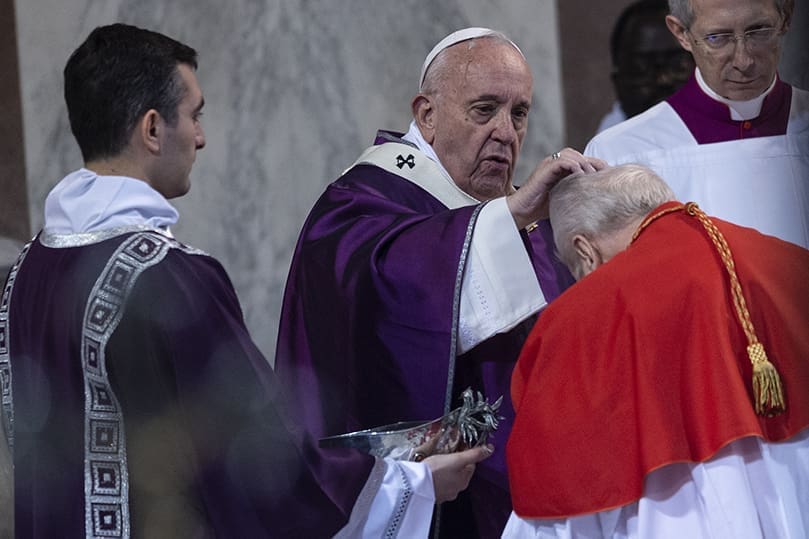 CNS photo/Cristian Gennari, pool
CNS photo/Cristian Gennari, poolAtlanta
Lenten ashes to be distributed by sprinkling
By GEORGIA BULLETIN STAFF | Published January 21, 2021
ATLANTA—In a Jan. 14 memo to pastors in the Archdiocese of Atlanta, Archbishop Gregory J. Hartmayer, OFM Conv., outlined liturgical adjustments to the traditional Blessing of Throats and to the distribution of ashes on Ash Wednesday. The archbishop also delegated that pastors can celebrate the Rite of Election at parishes for catechumens unable to attend the archdiocesan rites due to COVID-19 concerns.
On the Feast of St. Blaise, Feb. 3., a general blessing will be permitted instead of individually blessing throats.
For Ash Wednesday, Feb. 17, Archbishop Hartmayer asks priests to sprinkle ashes on the heads of penitents instead of tracing a cross on each person’s forehead.
The Congregation for Divine Worship and the Discipline of the Sacraments at the Vatican has published a note detailing how Catholic priests are to distribute ashes. After blessing the ashes and sprinkling them with holy water in silence, the priest addresses those present, reciting once the formula found in the Roman Missal—”Repent, and believe in the Gospel” or “Remember that you are dust, and to dust you shall return.” At that point, the priest cleanses his hands, puts on a face mask, and distributes ashes to those who come to him or, if appropriate, he goes to those who are standing in their places. He then sprinkles the ashes on each person’s head without saying anything.
The Rite of Election, when catechumens become the elect and are admitted to take part in the sacraments at the Easter Vigil, will be held at four parish locations this year on Feb. 20.
Only catechumens (unbaptized) and their sponsors will be able to attend. Traditionally, the liturgy of the Rite of Election is celebrated by the bishop or archbishop, who questions the godparents or sponsors to determine the readiness of the catechumens to be admitted to the elect.
The Rite of Election is required in the process of becoming Catholic and must be celebrated in person. It may not be done virtually. For parishes whose catechumens are able to attend the Rite of Election, pastors are encouraged to celebrate the Rite of Sending.
Archbishop Hartmayer permits pastors, whose catechumens are unable to attend, to perform the rite of election as his delegates.
“Given the present circumstances of COVID-19, we understand you may have catechumens who are unable to attend one of the four Rite of Election liturgies celebrated by our bishops,” he wrote to the priests.
The Rite of Calling the Candidates to Continuing Conversion is optional for baptized candidates, so pastors are not required to celebrate it, though are welcome to do so according to the Rite of Christian Initiation of Adults, distinguishing between catechumens and baptized candidates. For various reasons this year, this optional rite is not being combined with the Rite of Election, hence the directive that only directors, catechumens and sponsors attend.